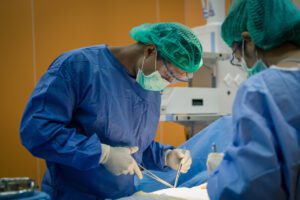
The concept of xenotransplantation between humans and pigs is not new, but it’s one that’s faced some hurdles on the road to becoming a viable organ transplant method.
The key concern was that the human recipient could contract serious – if not fatal – zoonotic diseases from pig organs via porcine endogenous retroviruses (PERVS).
But that could be about to change. Researchers have found a way to remove PERVS from the porcine genome with CRISPR-Cas9 gene editing. This research, published in the journal Science, is crucial to developing pigs that do not have retroviruses and are excellent xenotransplantation candidates.
“This represents a significant step forward towards the possibility of making xenotransplantation a reality,” Darren Griffin, a professor of genetics at the University of Kent, told the British newspaper The Independent last year.
“The chance of transmitting PERV from the pig organ to the human cells was a significant barrier and the study shows yet another application of the CRISPR-Cas9 system. By comprehensively demonstrating that PERV is the problem that we suspected that it may be, then providing a solution, the authors present a very elegant study.”
But Ian McConnell, emeritus professor of veterinarian medicine at the University of Cambridge, cautioned that the study should be seen as a “promising first step” in the world of xenotransplantation.
“It remains to be seen whether these results can be translated into a fully safe strategy in organ transplantation,” he said in the Independent piece. “Even if organs from these gene-edited pigs could be safely used to overcome virus transmission there remain formidable obstacles in overcoming immunological rejection and physiological incompatibility of pig organs in humans.”
The Independent notes that in addition to work involving putting pig organs into human hosts, xenotransplantation research is also looking at whether human organs could be grown inside other animals. Those organs would be genetically edited “so that they would in effect be a person’s.”
As we’ve written before, the biological similarities between humans and pigs make pig organs ideal for a wide range of medical research, from wound treatment to hernia repair.
Animal Biotech is proud to be a part of this kind of work. We’ve spent nearly 30 years helping biomedical professionals conduct their research with porcine tissues and organs.
Contact us today to learn how we can assist you in your next project.


